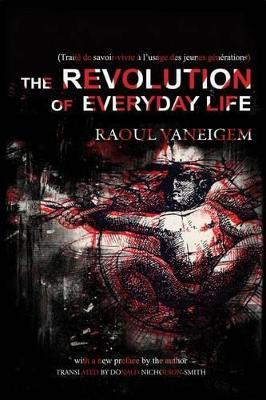Revolution of Everyday Life

Revolution of Everyday Life
One of the most important exponents of Situationist ideas, this treatise presents an impassioned critique of modern capitalism and serves as a cornerstone of modern radical thought. Originally published in early 1968, the book both kindled and colored the May 1968 upheavals in France that captured the attention of the world. In the political climate of today, Raoul Vaneigem's important work of radical anticapitalist thought has struck a new chord with the worldwide Occupy Movement. Naming and defining the alienating features of everyday life in consumer society--survival rather than living in full, the call to sacrifice, the cultivation of false needs, the dictatorship of the commodity, subjection to social roles, and the replacement of God by the economy--the book argues that the countervailing impulses that exist deep within this alienation, such as creativity, spontaneity, and poetry, present an authentic alternative to nihilistic consumerism. This carefully edited new translation marks the first North American publication of this important work and includes a new preface by the author and a translator's note.
Originally published just months before the May 1968 upheavals in France, Raoul Vaneigem's The Revolution of Everyday Life offered a lyrical and aphoristic critique of the "society of the spectacle" from the point of view of individual experience. Whereas Debord's masterful analysis of the new historical conditions that triggered the uprisings of the 1960s armed the revolutionaries of the time with theory, Vaneigem's book described their feelings of desperation directly, and armed them with "formulations capable of firing point-blank on our enemies." "I realise," writes Vaneigem in his introduction, "that I have given subjective will an easy time in this book, but let no one reproach me for this without first considering the extent to which the objective conditions of the contemporary world advance the cause of subjectivity day after day." Vaneigem names and defines the alienating features of everyday life in consumer society: survival rather than life, the call to sacrifice, the cultivation of false needs, the dictatorship of the commodity, subjection to social roles, and above all the replacement of God by the Economy. And in the second part of his book, "Reversal of Perspective," he explores the countervailing impulses that, in true dialectical fashion, persist within the deepest alienation: creativity, spontaneity, poetry, and the path
PRP: 129.13 Lei
Acesta este Pretul Recomandat de Producator. Pretul de vanzare al produsului este afisat mai jos.
116.22Lei
116.22Lei
129.13 LeiLivrare in 2-4 saptamani
Descrierea produsului
One of the most important exponents of Situationist ideas, this treatise presents an impassioned critique of modern capitalism and serves as a cornerstone of modern radical thought. Originally published in early 1968, the book both kindled and colored the May 1968 upheavals in France that captured the attention of the world. In the political climate of today, Raoul Vaneigem's important work of radical anticapitalist thought has struck a new chord with the worldwide Occupy Movement. Naming and defining the alienating features of everyday life in consumer society--survival rather than living in full, the call to sacrifice, the cultivation of false needs, the dictatorship of the commodity, subjection to social roles, and the replacement of God by the economy--the book argues that the countervailing impulses that exist deep within this alienation, such as creativity, spontaneity, and poetry, present an authentic alternative to nihilistic consumerism. This carefully edited new translation marks the first North American publication of this important work and includes a new preface by the author and a translator's note.
Originally published just months before the May 1968 upheavals in France, Raoul Vaneigem's The Revolution of Everyday Life offered a lyrical and aphoristic critique of the "society of the spectacle" from the point of view of individual experience. Whereas Debord's masterful analysis of the new historical conditions that triggered the uprisings of the 1960s armed the revolutionaries of the time with theory, Vaneigem's book described their feelings of desperation directly, and armed them with "formulations capable of firing point-blank on our enemies." "I realise," writes Vaneigem in his introduction, "that I have given subjective will an easy time in this book, but let no one reproach me for this without first considering the extent to which the objective conditions of the contemporary world advance the cause of subjectivity day after day." Vaneigem names and defines the alienating features of everyday life in consumer society: survival rather than life, the call to sacrifice, the cultivation of false needs, the dictatorship of the commodity, subjection to social roles, and above all the replacement of God by the Economy. And in the second part of his book, "Reversal of Perspective," he explores the countervailing impulses that, in true dialectical fashion, persist within the deepest alienation: creativity, spontaneity, poetry, and the path
Detaliile produsului








